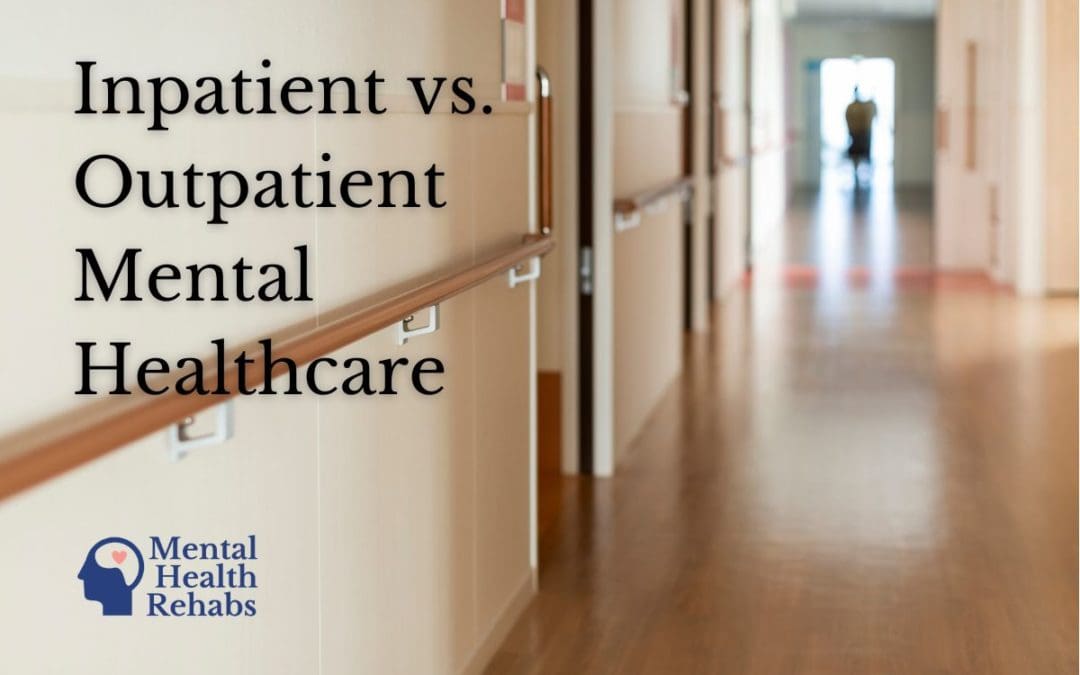Caring for your mental health can take many forms and shapes. When it comes to getting formal treatment, however, there are two main formats it can take: inpatient vs outpatient mental health programs. Depending on which type you choose, there can be significant differences in time commitment, types of activities (and rules), and not least of all, cost. Some psychiatric conditions may work better with inpatient treatment, while outpatient may be just fine for others. Here’s a breakdown of the differences between them and how to decide which is the right option for you.
Mental health rehabs: What are they?
The goal of any type of mental health treatment at a specialized mental health rehab is to help people live a normal life with whatever mental condition they’re facing. This includes managing their symptoms and developing healthy coping mechanisms for long-term mental well-being. They function similarly to drug rehabs and have similar differences in inpatient vs outpatient substance abuse treatment.
What is outpatient mental health treatment?
Outpatient mental health treatment is when a patient does not stay overnight at the treatment facility. Though the core treatment is going to be roughly the same as an inpatient program with the same therapy modalities and treatment methodologies, the primary difference is that patients return to their normal place of residence. However, that’s not the only difference between outpatient and inpatient treatment and that fact alone shouldn’t be a reason why a person chooses one program over another.
Outpatient is a less intensive form of treatment than inpatient which is the highest level of care (inpatient may include round-the-clock supervision for the safety of patients). Because of this, outpatient may not be the most suitable option for someone with a severe mental illness or who is experiencing debilitating mental illness symptoms. Instead, it may be better suited for someone who only has a mild mental condition or just needs moderate support in maintaining their mental well-being.
Pros & cons of outpatient treatment
Being able to come and go from treatment has a few obvious perks and some that are less so. It also has a few drawbacks in comparison to inpatient care to be aware of.
Pro: Lower Cost
One of the most significant benefits of outpatient treatment is cost savings. Staying onsite for inpatient treatment can make it significantly more expensive (there’s room and board, meals, and staff assistance, just to name a few things).
Additionally, insurance coverage for mental health rehab may depend on whether it’s outpatient or inpatient, which could potentially make it cheaper…or more expensive. Be sure to check your coverage whether they specify which type of mental health services are covered.
Pro: More Convenient
Not only can outpatient make mental health treatment more accessible financially, but it can also be a lot more convenient and allow people to fit treatment into their lives, rather than needing to make a major adjustment to accommodate treatment. Outpatient care can occur on a full- or part-time basis.
Depending on the structure of the program and the hours when activities take place, it might be possible to go to treatment while still going to work, school, and fulfilling other responsibilities at home. These conveniences can also add to lower auxiliary costs of treatment by preventing any loss of income or the need for childcare services.
Con: Less Structure
Unlike the highly controlled environment that inpatient provides, the increased freedom of outpatient treatment can come at the cost of external support and structure. That’s why with outpatient services, individuals will need to be highly disciplined to avoid backsliding or triggering their symptoms. Not the most conducive to someone with a serious mental illness who would need constant monitoring or guidance.
Con: Longer Treatment
Since outpatient treatment doesn’t involve being onsite 24/7 at the treatment facility, patients may find themselves with longer programs to achieve the same goals for their recovery plan. Whereas an inpatient program might require a month (or several) dedicated solely to healing and therapy, an outpatient program may require more time, especially if it’s a part-time outpatient mental health program.
Find Outpatient Mental Health Facilities Near Me
Inpatient treatment provides a holistic recovery experience with a higher level of care. Staying on-site means greater structure and support, but also more rules and restrictions. Outpatient offers lower costs, greater independence and convenience, but may cause treatment to take a little longer.
Ultimately, the decision should be based on which type of program best meets the needs of what you’re experiencing. This could entail going to both types of treatment, perhaps starting with inpatient and then transitioning to outpatient for mental health maintenance. Find a local mental health provider today.

